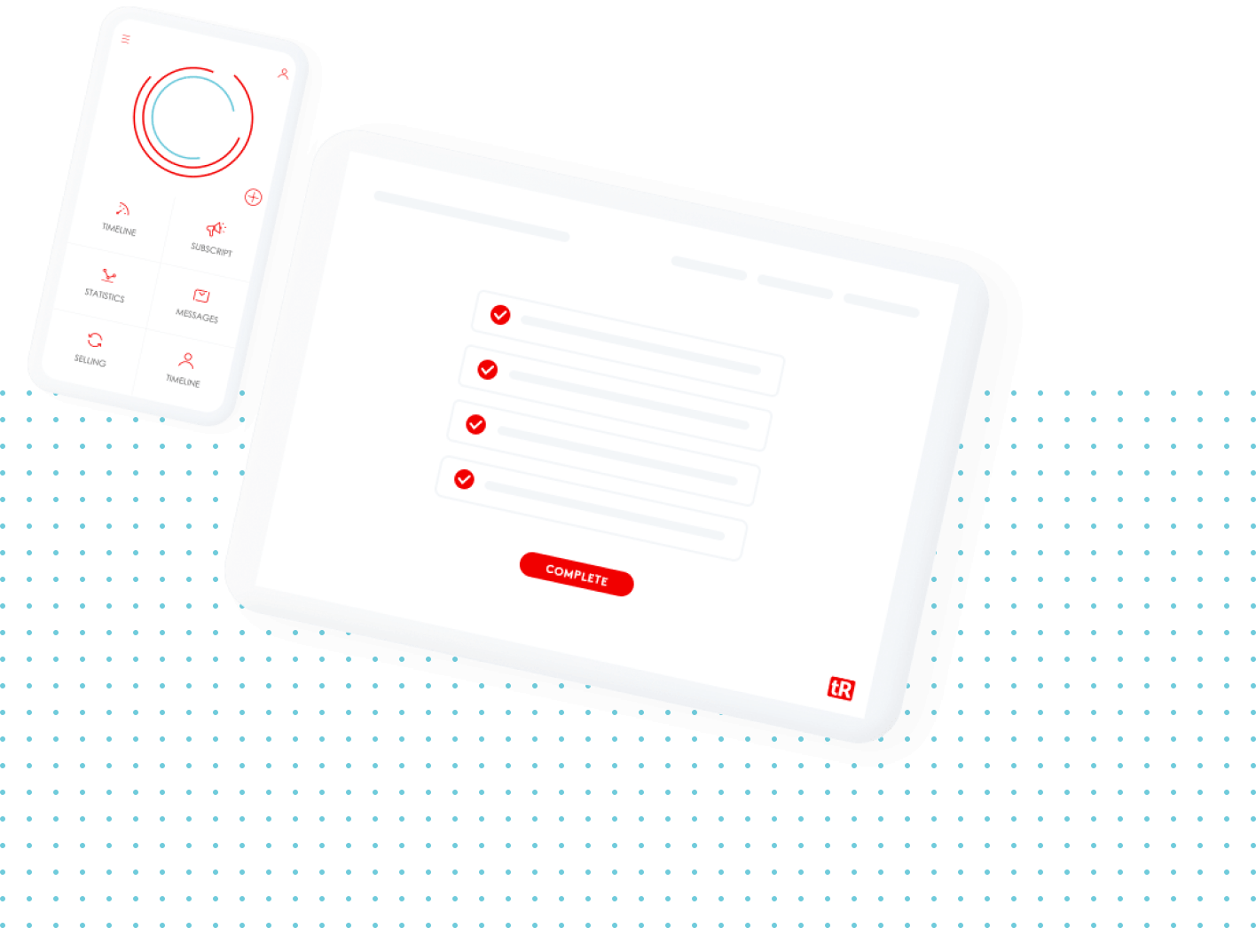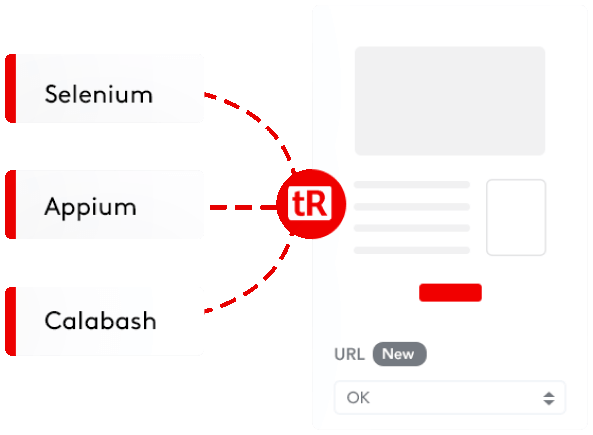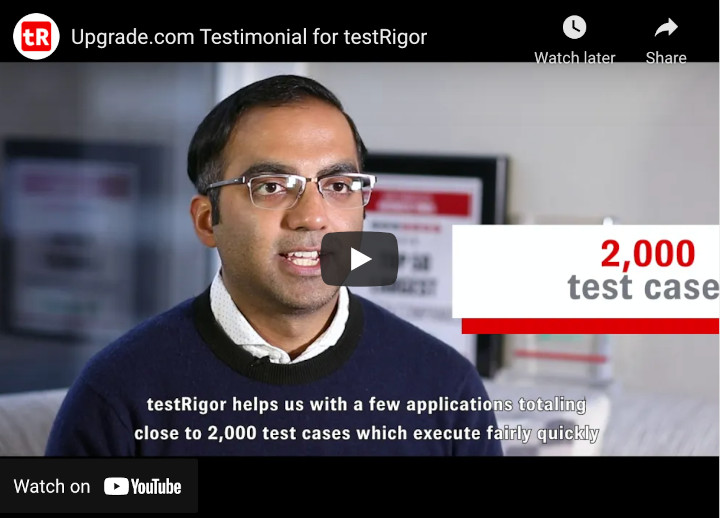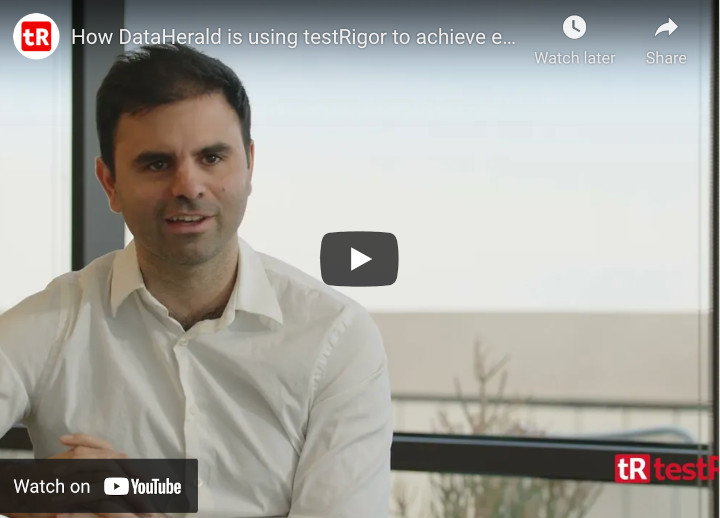#1 Test Automation Tool for Manual Testers
Build stable tests 15X faster than QA Engineers with Selenium by using plain English
Start here to get your free demo.

| Manual testers automate complex tests with testRigor | |
| 15X faster than QA Automation Engineers with Selenium | |
| 99.5% less maintenance compared to Selenium frameworks | |
| Create robust automated tests without flakiness of Selenium |
Selenium vs testRigor

 |
Requires expensive QA Automation Engineers/SDETs |
 |
Huge amount of maintenance |
 |
The most effort is dedicated to maintain test automation code |
 |
On average organizations only achieve 30% test coverage due to maintenance burden |
 |
Engineers' time is eaten up by constant test failure investigations |
 |
Tests are never stable due to changes in XPath and infrastructure instability |

 |
Manual testers write and maintain tests in plain English), without coding |
 |
Almost no maintenance |
 |
On average, testRigor’s users spend 99.5% less time on maintenance |
 |
90% or more test coverage in under a year |
 |
Anyone in your team including non-tech can understand test failures |
 |
Robust tests. Even if there is a browser or server crash during execution, testRigor will silently catch that and span a new instance. Tests work by emulating a human performing manual test |
Testing from end users' point of view with 200X less maintenance
More stable tests with minimal maintenance
Infrastructure stability with reasonable retries.

What Our Customers Are Saying

“With testRigor, we were able to generate automated tests quickly without adding maintenance overhead for our QA team.”
Here's another testimonial from Upgrade, a San Francisco-based FinTech company, which now creates 3X more automated tests than earlier with testRigor's behavior-driven regression testing strategy.
Rajan Arora
Sr. Director of Engineering - Upgrade

“The tool is so easy to use, that if you speak English you can figure out how to use the tool”
At DataHerald they were unhappy with having to utilize engineering resources to build and maintain test automation with Selenium. The decision to switch to testRigor was a no-brainer since they can now create more tests with just one manual QA tester.
Amir Zohrenejad
Co-Founder & CTO - DataHerald


“My team can automate, that is a huge win because you do not need technical skillsets. You can leverage testRigor's technology to write the test case in plain English.”
“The manual team does not need to be sidelined and I don’t need to hire separate experts for automating scenarios.”


“The easier platform to achieve the consistency of maintaining and running the tests in a speedy way.”
FAQ
How is testRigor's test automation different from Selenium?
1. Tests are automatically generated based on our AI's mirroring of how your end users are using your application in your production environment. In addition, tests are produced to map your most important functionality out of the box. This is achieved by using our JavaScript library in your production environment to capture metadata around your users' habits within your app. We use this metadata to automatically generate & maintain behavior-driven tests for your most frequently used functionality & flows. We also add the possibility for tests of most important functionality based on common and industry-specific rules.
2. Our tests are in plain English, so it is possible to understand what is being tested and to search for all tests affecting certain buttons, inputs, etc. Using the same language support, you can also customize rules to fit your own internal verbiage.
3. Because testRigor tests are not dependent on XPath, they are ultra-stable. Our customers are running thousands of tests multiple times a day without a single failure.
4. Our tests are adaptable. We not only extract and show unique issues, but we also identify and group together all the cases affected by the same issue and allow our customers to fix them in place all at once with quick and easy editing tools.
How are you different from Cucumber/Gherkin?
You can think of testRigor as Cucumber already implemented for your project. We have eliminated the need to write and maintain any underlying Selenium code, as our system uses an NLP-based parser to parse plain English and executes your specifications in place.
What are your end-to-end tests actually testing for?
Acceptance-level functional UI-level regression tests. We test that functionality works via UI. For example, for Amazon we would test that a person can successfully purchase a product from log in to purchase confirmation.
What do you test well?
Our system is particularly adept at testing form-based UI or functionality that has a predictable input/output. A few other strengths unique to our tool are... 1. ...cases that require multiple users to interact be the same flow be it via email, SMS, or instant messages. 2. ...cases built for platforms with constantly changing code and HTML IDs. 3. ...complex flows that need to combine actions like image comparison, audio quality, dragging & dropping all into one.
What don't you test well?
We don't test games.


















